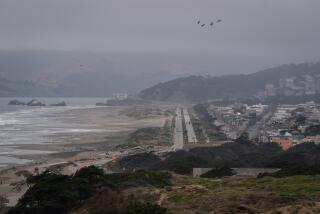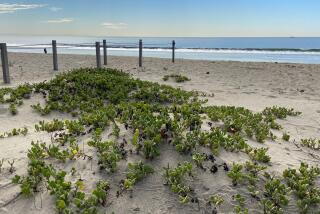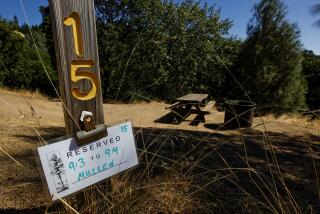Blocking Californians’ beach access will soon carry a hefty fine
Frustrated beachgoers this summer will finally have a remedy against anyone who blocks public access to California’s shoreline.
Under a new law that takes effect Tuesday, the California Coastal Commission will for the first time have the authority to impose fines on violators.
The change, signed into law by Gov. Jerry Brown as part of the state budget, gives the commission the most powerful tool it has had since its 1972 inception to crack down on property owners who use illegal gates, security guards, fake “no parking” signs and creative landscaping to keep the public out.
Until now, most violations were resolved through voluntary settlements because the tiny state agency could collect fines only by taking offenders to court. The process was rarely used, costly and time-consuming, allowing some of the worst offenders to ignore the commission’s orders and break the law with no consequences.
Coastal advocates said they expect administrative penalties to deter would-be violators and help clear a growing backlog of hundreds of public access cases concentrated in wealthy Southern California enclaves like Malibu and Newport Beach, where some of the priciest real estate meets the most desirable beaches.
“The governor and the Legislature chose to defend the rights of working class families to get to the beach versus the efforts of billionaires to block that access,” said Warner Chabot, a longtime coastal advocate and former head of the California League of Conservation Voters.
The California Constitution says the public owns all the coastline seaward of the mean high tide line, which generally means visitors have the right to walk on the wet sand and often farther onto the beach.
But coastal regulators have long been frustrated by the elaborate measures some beachfront residents take to keep the public at bay. Oceanfront residents from San Diego to Santa Cruz have put out traffic cones, chains and boulders to block public parking spots for beachgoers and have resisted opening coastal accessways next to their homes.
In Newport Beach, residents have occupied the sand near their homes with lawns, patios, lounge chairs and hedges that give the impression the public beach is their private backyard.
The commission’s new authority is limited to public-access violations, which occur in about one-third of the agency’s more than 2,000 unresolved enforcement cases.
The new law does not allow the agency to impose fines for other offenses, such as unpermitted development or the destruction of coastal habitat along the 1,100 miles of coastline the agency regulates under the 1976 Coastal Act. For violators who refuse to settle those cases, the agency will still have to seek enforcement through the courts.
A bill that would have given the Coastal Commission the authority to issue fines for all types of violations — a power it has sought for decades — failed in the state Assembly last fall after heavy opposition from business interests.
Assembly Speaker Toni Atkins (D-San Diego), who sponsored last year’s unsuccessful bill, said “the use of fines is most valuable in terms of the Coastal Commission being able to stop the unlawful blocking of public beaches. I’m delighted we were able to get this important protection for coastal access into the budget.”
Under the new law, the commission may impose fines of up to $11,250 a day for each Coastal Act violation, which is less than the $15,000 maximum the agency could obtain in court.
Agency officials still expect to resolve most cases through voluntary agreements, but said the threat of penalties could motivate offenders to act more quickly to open public accessways and remove obstacles to the shore.
Once the commission gives notice, “the clock starts ticking and there’s a real motive for them to resolve things and get them back open to the public,” said Lisa Haage, the commission’s chief of enforcement.
“We’re not interested in punishing people, we’re interested in protecting access,” Haage said. “This will give us a tool to prevent future problems from cropping up.”
Property rights groups said the commission’s new authority tips the balance toward a land-use regulator they say already has too much clout.
“Before the bill was enacted the commission could never actually do anything against a property owner,” said Damien Schiff, an attorney at Pacific Legal Foundation, one of the commission’s most strident critics. “Now you have that leverage essentially reversed and there is certainly the potential for abuse.”
“Now, maybe the commission will use this power responsibly and judiciously,” Schiff said. “And that’s our hope.”
Penalties must be approved by the 12-member commission at a public hearing and can be appealed in court. The law allows those cited to avoid paying fines if they correct the violation within 30 days.
The fines will go to the Coastal Conservancy, a separate state agency, to pay for coastal-access improvement projects.
Twitter: @tonybarboza







